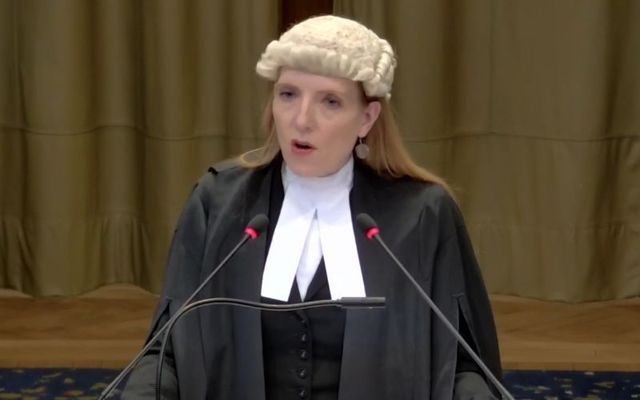Blinne Ní Ghrálaigh KC, the Irish lawyer serving as Counsel and Advocate for the Republic of South Africa to the International Court of Justice (ICJ), delivered a statement in The Hague today, Thursday, January 11.
The ICJ announced on December 29 that South Africa had filed an application instituting proceedings against Israel, alleging that Israel "in relation to Palestinians in Gaza, is in violation of its obligations under the Genocide Convention.”
The public hearings at the ICJ at the Peace Palace in The Hague, the seat of the Court, began today; South Africa’s team is delivering its oral arguments on Thursday while Israel’s team will deliver oral arguments tomorrow, Friday, January 12.
“There is an urgent need for provisional measures to protect Palestinians in Gaza from the irreparable prejudice caused by Israel’s violations of the Genocide Convention,” Ní Ghrálaigh told the court on Thursday. "There could not be a clearer or more compelling case."
She asserted: “It is becoming ever clearer that huge swathes of Gaza — entire towns, villages, refugee camps — are being wiped from the map."
Ní Ghrálaigh said how in Gaza, "nearly two million people — over 85 percent of the population" have been forced to flee their homes and shelters, oftentimes more than once, into "ever-shrinking slivers of land, where they continue to be bombed and killed.
"This is a population that Israel had already made vulnerable through 16 years of military blockade and crippling 'de-development.'"
She said: "Without a halt to Israel’s military activity in Gaza, there will be no end to the extreme situation facing Palestinian civilians."
Ní Ghrálaigh went on to argue: "It would be a complete departure from the long and distinguished line of jurisprudence that this Court has firmly established — and recently reconfirmed — for the Court not to order provisional measures in this case.
"The imminent risk of death, harm, and destruction that Palestinians in Gaza face today, and that they risk every day during the pendency of these proceedings, on any view justifies — indeed compels — the indication of provisional measures.
"Some might say that the very reputation of international law — its ability and willingness to bind and to protect all peoples equally — hangs in the balance."
Ní Ghrálaigh said: "The international community continues to fail the Palestinian people, despite the overt dehumanizing genocidal rhetoric by Israeli governmental and military officials, matched by the Israeli military’s actions on the ground; despite the horror of the genocide against the Palestinian population being livestreamed from Gaza to our mobile phones, computers, and televisions screens — the first genocide in history where its victims are broadcasting their own destruction in real-time in the desperate — so far vain — hope that the world might do something."
According to the AP, a decision on the request for so-called “provisional measures” will likely take weeks. The case is likely to last years.
Ireland's position on South Africa's genocide case against Israel
South Africa's genocide case against Israel has been formally endorsed by more than a dozen other countries and international organizations; Ireland has not endorsed the case, though it has been consistent in calling for a ceasefire.
On Sunday, Taoiseach Leo Varadkar said on RTÉ Radio that Ireland "does not intend" to join the proceedings.
"I really think this is an area where we need to be very careful," Varadkar said.
“What’s happened in Gaza is appalling - over 20,000 people killed, mostly innocent civilians, mostly women and children, very possibly war crimes committed both by Israel and Hamas when it comes to the events of the last few months.
"Genocide is something very particular. It is defined as an attempt, a deliberate attempt to destroy an entire nation, an entire race, or to do so in large part.
“And one group of people that has experienced that in the world are Jewish people, the Holocaust. Six million Jews killed here in Europe, and Hitler had a plan to kill many millions more – that is genocide."
Varadkar added: "We need to be very careful about genocide in that context."
He said the international court will determine whether or not the situation in Gaza is genocide.
Ireland's opposition parties disagree with Varadkar's stance. On Tuesday, representatives from Irish political parties Sinn Féin, Labour, Social Democrats, and People Before Profit called upon the Irish Government to join the proceedings.
On Thursday, the day the public hearings began in The Hague, TD Matt Carthy, Sinn Féin's spokesperson on Foreign Affairs, said: “I welcome that South Africa made the decision to take this case to the International Court of Justice under the Genocide Convention.
"As a signatory to the Convention, the Irish government is also legally obliged to take action to prevent genocide and, in Sinn Féin’s view, they should reverse position."
He added: “It smacks of the double standards that have been evident since the war in Gaza began that governments, including Ireland, that supported the case taken against Russia now refuse to do so in the case of Israel."
He further added: “The Irish people have been horrified by the actions of Israel in Gaza and the failure of the international community to demand they stop.
"They have welcomed the strong words of the Irish government.
"They now want to see these words being matched by actions."




Comments